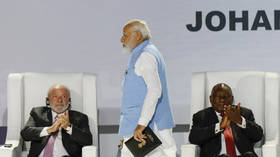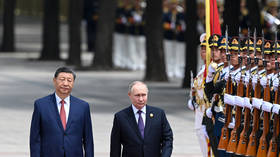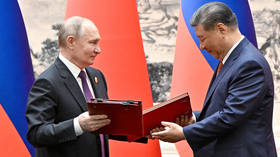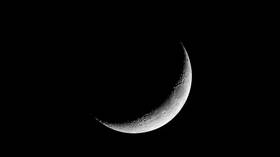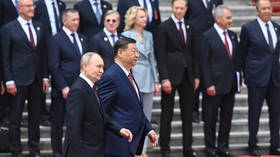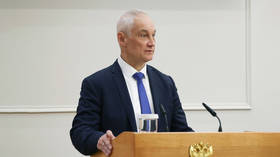India backs quota for women in parliament, after 25-year delay
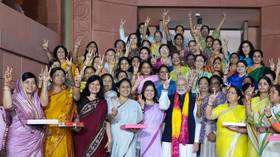
India’s upper house of parliament on Thursday passed a bill that reserves a third of seats in the national and state legislative assemblies for women. Hailing the development as a “defining moment' in the country's democratic journey, Prime Minister Narendra Modi noted the unanimous support for the bill.
All 215 members of the Rajya Sabha, the upper house, voted in support of the legislation, just a day after it cleared the lower house, the Lok Sabha, with a resounding majority of 454 votes in favor and two against.
“A defining moment in our nation's democratic journey! Congratulations to 140 crore Indians... With the passage of the Nari Shakti Vandan Adhiniyam in Parliament, we usher in an era of stronger representation and empowerment for the women of India. This is not merely a legislation; it is a tribute to the countless women who have made our nation,” Modi said in a post on X (formerly Twitter). The chairman of Rajya Sabha, Jagdeep Dhankhar, and several top ministers in the Modi government, called the moment “historic.”
Had the honor of meeting our dynamic women MPs who are absolutely thrilled at the passage of the Nari Shakti Vandan Adhiniyam. It is gladdening to see the torchbearers of change come together to celebrate the very legislation they have championed. With the passage of the Nari… pic.twitter.com/et8bukQ6Nj
— Narendra Modi (@narendramodi) September 21, 2023
The Constitution (One Hundred and Twenty-Eighth Amendment) Bill, 2023, will now require ratification by at least 50% of state assemblies to become law.
The legislation seeks to ensure that one third of seats are reserved for women in state and central legislative assemblies, but will not apply to the upper house of parliament and state legislatures. The allocation of the seats for women is proposed to continue for 15 years.
Although the Women’s Reservation Bill has been welcomed in principle by most political leaders, some critics have questioned the delay in its implementation, which hinges on a delimitation exercise to redraw parliamentary and assembly constituencies based on a fresh national census, which was due in 2021, but has been postponed due to the Covid-19 pandemic.
The government has clarified that according to Article 82 of the Constitution, amended in 2002, the next delimitation exercise can be carried out based on the first census taken after 2026, which would make the implementation of the Women’s Reservation Bill possible only after 2029.
The delimitation process will redraw the electoral map of India, as it will alter the number of seats each state gets in the lower house, with the total number of Lok Sabha seats increasing from the present 543 to over 840, according to Indian Express.
India’s Home Minister Amit Shah, addressing the concerns over the bill, said that a census will be conducted soon after the 2024 elections in order to expedite its implementation. Meanwhile, Congress party leader Rahul Gandhi demanded that the bill be implemented “immediately,” saying there was “no need for delimitation and census.”
Attempts to create a quota for women have been ongoing since 1996, when a constitutional amendment bill seeking to reserve one third of seats for women in the Lok Sabha and state legislative assemblies, was tabled in parliament. Similar versions of the bill were introduced later in 1998, 1999, and 2008, but lapsed with the dissolution of those governments. In 2010, when the Congress party-led United Progressive Alliance was in power, India’s upper house passed the Women's Reservation Bill. However, it was never taken up for consideration in the the lower house, and eventually lapsed in 2014 with the dissolution of the Lok Sabha.
